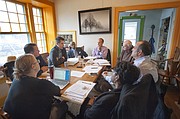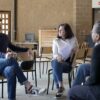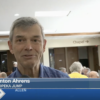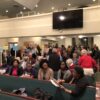February 8, 2015. The Lawrence Journal-World.
The Rev. Verdell Taylor explains the difference between mercy and justice with a fable.
In it, a man goes to the river every day and rescues a baby who has drifted downstream in a basket, said Taylor, of St. Luke African Methodist Episcopal Church. Taylor calls that an act of mercy. Justice would involve going up river to determine the cause and fixing the problem.
Taylor said Justice Matters, a group of 22 faith organizations including Christian, Islamic and Jewish communities, is “going upstream” in Lawrence, aiming to define the most significant injustices and looking for solutions to their root causes.
Rev. Mary Newberg Gale, of First Presbyterian Church, said that most congregations do well at providing mercy through food drives and soup kitchens, but if justice were achieved, there would be no need for those services.
“We want to tackle those issues that leave people in a position that we are acting mercifully toward them,” Newberg Gale said. “We are addressing the systematic root causes.”
Newberg Gale said though the group’s members often have starkly different standpoints on specific aspects of religion, it is easy to cut through the divisive factors to work together toward a common goal.
In 2013, local faith leaders began talking with national organization,Direct Action and Resource Center, or DART, about whether they might be able to make a difference, Taylor said. They then formed Justice Matters in March.
National group
DART, founded by former Peace Corps member John Calkins and led by Rev. John Aeschbury, both of Florida, is a national network of “grassroots organizers” who use a listening, research and assembly approach to bring systemic change, according to the organization’s website. Currently, there are 20 groups affiliated with DART in Florida, Indiana, Kansas, Kentucky, Ohio, South Carolina and Virginia.
Justice Matters recently finished the first phase of its six-month research process. Last fall, the group asked about 1,000 congregation and community members questions such as “What keeps you up at night?” and “What would a just Lawrence look like?”
Newberg Gale said the in-depth process would increase the likelihood of their proposals’ success.
“Often we see something happening and we already see what the solution should be,” Newberg Gale said. “(Justice Matters) spends time to allow the conversations with professionals and those affected and we do that to a real depth.”
Through the process, the group found 12 common themes, and members of the public in November narrowed the list down to three issues: mental health, affordable housing and children’s issues.
Talking with experts
The group is now in the solution research phase, speaking with local experts and community leaders and reviewing published studies. Justice Matters members have split into three groups, each focusing on one issue. So far, the committees have met with about 35 professionals, including Kansas University professors, organization executives and city employees.
KU professor of Social Work Terri Friedline consulted with Justice Matters about children’s issues. Friedline said she thought the group’s intent was admirable.
“We need more people and groups committed to bringing justice and change into the world to make it a better, safer place for future generations,” Friedline said. “I was glad to be a small part of the group committed to those endeavors.”
While researching affordable housing, the group recently consulted Willow Domestic Violence Shelter executive director Joan Schultz, who said Justice Matters members are “asking all the right questions.”
“They’re not shying away from solutions,” Schultz said. “It’s an enormous undertaking and very needed.”
City Commissioner Jeremy Farmer said that to his knowledge, the group has not met with city commissioners, but he is “looking forward to hearing their reports” as he and city staff research housing policies in other cities.
“I hope that (the reports) coincide with some work that I’m doing on the affordable housing issue,” Farmer said.
Over the next few months, the Justice Matters committees will narrow the broader issues to a few approachable problems, group leaders said. They’ll then come up with systematic changes they say will have long-term impact.
“A just Lawrence will feel fair to all people,” Taylor said. “(Injustice) is there, it’s all around us, and everybody is affected by it.”
The Topeka experience
The group plans to present its findings and suggestions to decision makers, who could include city commissioners, business owners, landlords, organizations or other relevant officials, at the Lied Center May 7. DART employee and Justice Matters organizer Ben MacConnell said the goal is to have 2,000 people at the event.
DART’s other Kansas affiliate, Topeka’s “Justice and Unity Ministry Project,” saw controversy in 2014 at a similar event at which the group sought change with Topeka schools’ Superintendent Julie Ford. The Topeka Capital-Journal reported members wore hardhats and told Ford only to answer “yes” or “no” to questions about implementing Communities in Schools programs in 10 elementary schools.
The 1,000-person “tense” assembly ultimately ended prematurely, with Ford insisting there weren’t funds for their proposal, the Capital-Journal reported. Ford said she thought the event would include JUMP committing to raising money for Communities in Schools, which provides support for students and families to help kids stay in school and achieve.
MacConnell said JUMP members met with Ford before the assembly and were taken aback by her public stance. In the end, the group’s efforts paid off, MacConnell said, when Topeka put the Communities in Schools program in three elementary schools.
Justice Matters co-president and Morning Star Church pastor John McDermott said that, in light of the Topeka group’s assembly, the Lawrence DART affiliate is “going to do (their) very best to reach an agreement (with relevant decision makers) before” their public gathering.






